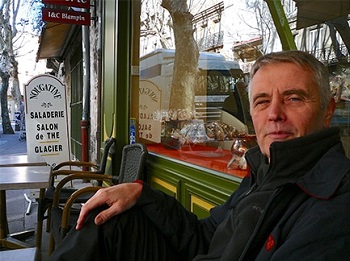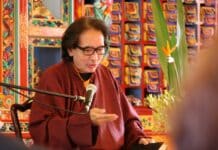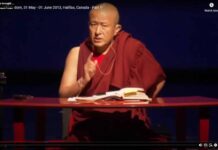
I read something recently that recalled the evening I heard Chögyam Trungpa speak in Toronto in the autumn of 1971. My memories of that evening come back to me occasionally, and they surfaced again while I was reading Opening a Mountain: Koans of the Zen Masters. The book is a deeply contextualized collection of stories and commentaries about early Chinese Ch’an (Zen) masters. Most of the dialogues date from that splendid age of culture and Ch’an Buddhism in the T’ang period (618-917 BC).
In one of the stories the fifth Ch’an patriarch was in the process of deciding on a successor. During a poetry contest to discover his successor, the most likely candidate presented a poem to demonstrate the depth of his understanding. The poem contained a metaphor comparing the mind to a mirror that must be wiped clean so that no dust settles on it. Hui-neng was a young, poor, and uneducated monk in the sangha. He listened to the poem with concern. At the time, he was not able to read or write, and was assigned to menial duties in the monastery. In spite of the limitations of his background, he had reservations about the potential successor’s poem. Hui-neng was not regarded as patriarchal material, but he expressed his concerns about the nature of the understanding revealed in the verse of the possible successor, and said:
Bodhi fundamentally has no tree,
The mirror is without a stand;
Originally there is nothing at all,
So where can the dust collect?
[Opening a Mountain, Steven Heine, Oxford University Press, pp 158-9.]
The fifth patriarch declared Hui-neng the winner, a decision that led to an outbreak of unenlightened consternation and monastic high dudgeon. Hui-neng faced considerable difficulties from angered members of the sangha who preferred another deeply educated candidate instead of someone as rustic as he was. Hui-neng was forced to flee the monastery, pursued by unhappy monks, and a former Chinese general who must have temporarily set aside a number of his monastic vows. The impoverished Hui-neng eventually became the sixth patriarch. There is a more detailed version of this unexpected reversal in The Platform Sutra. The story brought to mind the challenge of another dust free mirror presented to Trungpa Rinpoche over 40 years ago.
It was October 1971. For me it was a time of learning, great hope, and optimistic possibilities. Information was being exchanged between cultures and countries at a rapidly accelerating rate. As part of this exchange, a number of people I knew were slogging their way through the Oxford University Press version of The Tibetan Book of the Dead. The image of that mountain of slabs of putty on the cover of the Evans-Wentz translation was intriguing. But the post-Victorian English inside, with its addresses to “thou,” and its “shineth” verb forms, helped to ensure that the profound teachings in the book remained impenetrable for many of us.
One evening, there was a knock on my door in residence at the University of Toronto. It was Doug, another student I didn’t know very well, and he asked me if I wanted to attend a talk by a Tibetan speaker. It was a cold night, and I declined, but he asked again, and we argued about whether I should go or not. Finally I gave in, and agreed to accompany him to see someone I hadn’t heard of. We walked east from the campus to an old United Church on the south side of Bloor Street, east of Yonge Street. That church is gone now, replaced by a very large church, the National Office of the United Church of Canada.
By the time we got there, the church hall was packed, with almost all the seats taken on the ground floor, and in the horseshoe balcony above. We sat down about 25 feet from the stage. The room fell silent as Trungpa Rinpoche appeared from the back of the stage in a white dress shirt and dark trousers. He walked out into the light on the middle of the stage. No one introduced him, and no applause greeted him. He moved carefully, almost gingerly, as if taking in the feel of the audience. He walked across the floor and sat down on a plain wooden chair on the otherwise empty stage. He may have still been recovering from his recent automobile accident. He carried a deep and considerable presence.
Initially there were a number of unremarkable and cautiously Canadian questions from the audience. Then a woman with a strong German accent began to ask Trungpa Rinpoche somewhat unclear questions about her interaction with her television. It took everyone in the room a few minutes to realize that she was certain that she was having conversations with her television. And this was before cable and satellite TV, and Fox News led many viewers to start talking, or vainly raising their voices at their televisions. Over the course of a number of exchanges, Trungpa Rinpoche helped to clarify what she was saying, and then told her gently that she might be talking to her television, but that her television could not have a conversation with her. She insisted that it was. He paused long enough to let the disagreement settle, but not so long that she could begin to insist again, and then he took another question.
He moved quietly through his responses to a number of other questions. He was so attentive to his answers that it seemed as if he were hearing many of the questions for the first time. At one point he looked up to the balcony on his right and gestured to a thin and ascetic man who wished to speak. He was a Toronto yoga teacher of modest repute, whose yoga books were sold in many bookstores in the city. After a brief pause, he looked down at Trungpa Rinpoche, and said, “When I look into the mirror of the self, I see no dust.”
In the silence that fell over the hall, I sensed a range of reactions. Some people felt consternation at what seemed to be a not very Canadian challenge to a visiting speaker. Others may have recalled the story of the response of Zen Buddhism’s sixth patriarch to the question posed centuries ago. Some were confused as to what the statement meant. There was also the occasional “Wow,” expressed almost sub-vocally, but no one whispered, “Far out!”
Trungpa Rinpoche looked up at him steadily as if taking the measure of this man. He exhibited the same combination of thoughtfulness and compassion he had shown to everyone who posed questions that evening. Then he said, without judgement or competitiveness, “Why are you telling me?”
In response to his question, another wave of reactions swept through the audience. The most notable one occurred next to me.
Doug had been sitting beside me without comment all evening. But suddenly, in response to Trungpa Rinpoche’s question, he jumped to his feet. His body was trembling, almost shaking. There was a distinct lack of equanimity in his movements. He had been seized by some emotion that was about to become clear as he leaned his whole body toward the yoga teacher up in the balcony, and stretched out his right arm. He pointed his index finger at him, and yelled as loud as he could, “Hah!” I felt conflicted. I was embarrassed by his contempt for the balcony yogi. Some people in the audience grumbled or nodded forcefully to support Doug’s anger and attempt to humiliate the man in the balcony. So much for responses free of judgement, competitiveness, or anger. But most people murmured quietly. Trungpa Rinpoche returned to taking questions. It was as if he had laid a calming hand over the room.
There is another reason I have recorded my recollection of this appearance by Trungpa Rinpoche. In the chronologies of his life that I have seen, I have not been able to find a reference to this evening in Toronto. If there is another account of it, I would enjoy seeing it.
This was probably one of the first visits by the great Tibetan teacher to Canada. It took me a number of years to sort out what I had seen, and to make sense of it. I knew immediately that in Chögyam Trungpa I had seen someone unlike anyone I had ever seen or read about. For me it wasn’t the way he had handled the Chan or Zen dust free mirror question, but more about how he had treated the delusional woman who was convinced that her TV was conversing with her. It was the memory of his kindness to her and the other members of the audience that kept coming back to me. Over the years, the significance of that first teaching in loving kindness has increased. I have not read about Trungpa Rinpoche’s appearance in Toronto in 1971. It does not appear in Midal’s Chögyam Trungpa: His Life and Mission.
We are fortunate in a lifetime if we have a number of experiences that change the course of our lives for the better. This was one of them for me. It set me on a course of study and practice that has continued for decades.










